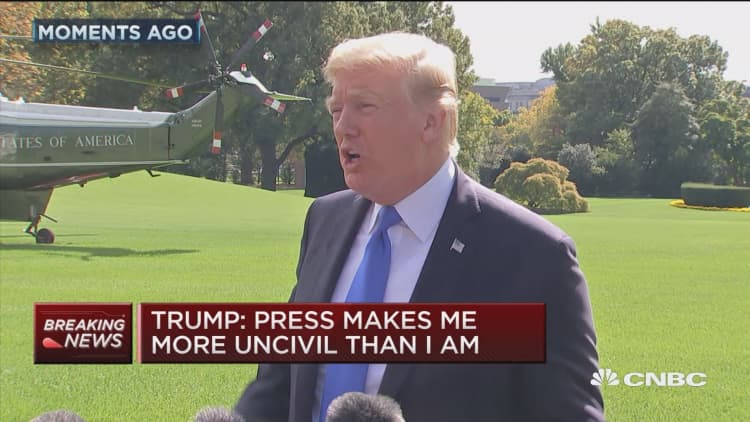Any changes to taxes on your 401(k) savings won't change two key tenets of planning for retirement: Save early and save as much as possible.
That's according to retirement experts even as 401(k) plans have gotten drawn into the tax-reform debate in Washington.
Right now, workers who have access to 401(k) plans will be able to invest up to $18,500 next year, while participants age 50 and over will be able to put away $6,000 more. Under current rules, investors will not pay taxes on those contributions until a later date.
That could all change if some lawmakers have their way. Limits for pretax contributions to 401(k) plans could be lowered to $2,400 as Congress looks to make up for other tax cuts.
President Donald Trump has said he is reluctant to make changes to the popular savings program. But Rep. Kevin Brady, a top tax writer, said Wednesday that changes could still happen.

The debate comes even as America faces a retirement crisis, with many having saved too little to carry them through their later years.
The balances for 401(k) and individual retirement accounts held by households ages 55 to 64 reached a median $135,000 in 2016, up from $111,000 in 2013, according to the Center for Retirement Research at Boston College. That provides for about $600 per month in retirement. About half of households that are close to retirement have no 401(k) savings, the center found.
About 54 million workers participate in 401(k) plans, according to the Investment Company Institute, an association of investment companies. Yet many workers do not have access to these plans because they are self-employed or their employer does not offer one.
Nevertheless, retirement experts expressed concern about the negative impact the changes could have.
We would not be talking about this except for the budget gains.Alicia H. Munnelldirector, Center for Retirement Research
"We would not be talking about this except for the budget gains," center director Alicia H. Munnell said. "I think the risk of people substantially reducing their contributions because they no longer see the benefit of an immediate deduction is very high."
Research published by Munnell this month indicates that some savings could increase if investors are pushed to post-tax retirement investments.
That is based on the assumption that 50 percent of people would maintain the amount they contribute to their 401(k), which would result in more wealth during retirement because that money has already been taxed. If the other 50 percent decreases their contributions, their take-home pay could be the same with the Roth contribution as it was without it, resulting in the same amount of after-tax wealth, according to Munnell.
Reducing dollar contributions to 401(k)s to maintain take-home pay
| Traditional | Roth | |
| Income | $60,000 | $60,000 |
| Saving | $6,000 (pre-tax) | $4,800 (post-tax) |
| Tax paid | $10,800 | $12,000 |
| Take-home pay | $43,200 | $43,200 |
Source: Source: Alicia H. Munnell, director at Center for Retirement Research at Boston College
But problems could arise with new rules, Munnell said.
Investors could cut back their contributions more than just slightly. And the option to cash out completely could be seen as more attractive because taxes have already been paid on the money.
"I think that irrational responses may well lead people to save less," Munnell said.
Financial advisers who work with individual investors also said they are concerned about how such changes to 401(k)s could negatively impact people.
"They would stop saving for retirement," said David Edwards, president and wealth advisor at Heron Wealth, a financial planning firm in New York.
Behavior plays a part
The reason has to do with behavioral finance, he said. When saving for retirement with pretax money, it feels like someone else is paying for it. Take away that benefit, and saving becomes less appealing.
"You'll get a huge tax benefit when you retire, but it won't feel the same way," Edwards said.
The fact that only certain individuals have access to these retirement plans is unfair, Edwards said. A more beneficial change for legislators to consider would be opening up the Thrift Savings Plan, available to federal workers, for everyone, he said.
Scott Hanson, co-founder and senior partner at Hanson McClain Advisors in Sacramento, California, said the rumored changes could discourage people from saving for retirement when most already are not saving enough.
"What I wish was part of this discussion is separating retirement savings from the employer," which could provide more options for investors, Hanson said.
If the changes do go through, investors will need to maintain the momentum and amount they are saving for retirement, said Geri Eisenman Pell, CEO of Pell Wealth Partners.
"We can't have people take their eye off the ball in terms of saving for retirement," Eisenman Pell said. "That does not mean to stop saving for retirement. It means to save differently."
Investors could diversify with investments such as Roth IRAs, regular IRAs and life insurance policies, she said. They may also look to annuities because, like 401(k)s, the money invested in them is often tax-deferred and can be automated, she said.

As the effects of these possible changes are debated, the discussion in Washington is likely just beginning, said Lee Covington, senior vice president and general counsel at the Insured Retirement Institute, a trade organization representing the retirement income industry.
Senate members who oppose the changes to 401(k) contribution limits may send letters to other senators urging them to join them, Covington said.
"We don't want to take one step forward and take one step back," Covington said. "We want to see the current tax deferral for retirement savings preserved."


